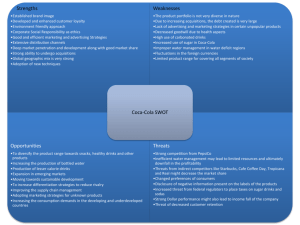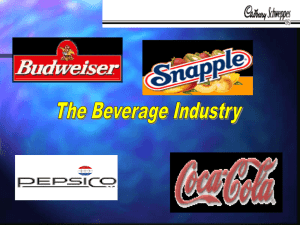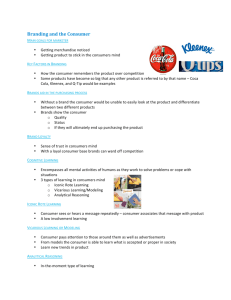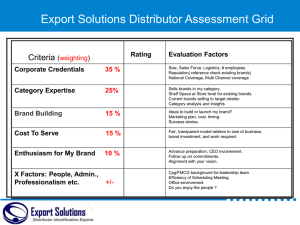britvic_-_case_study
advertisement
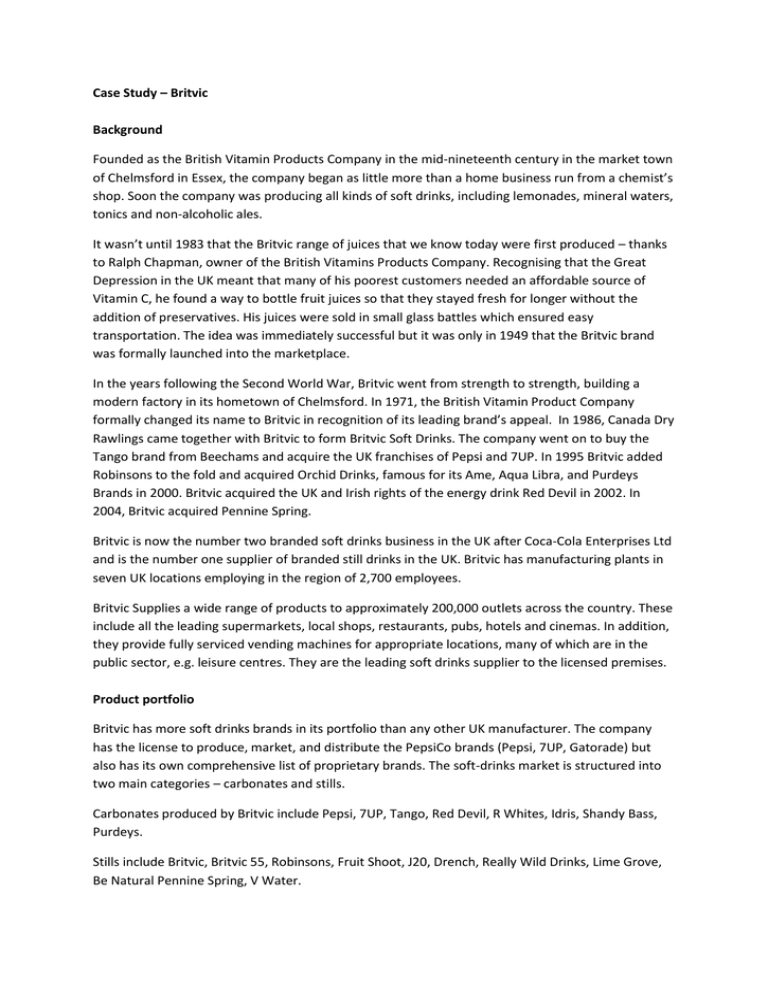
Case Study – Britvic Background Founded as the British Vitamin Products Company in the mid-nineteenth century in the market town of Chelmsford in Essex, the company began as little more than a home business run from a chemist’s shop. Soon the company was producing all kinds of soft drinks, including lemonades, mineral waters, tonics and non-alcoholic ales. It wasn’t until 1983 that the Britvic range of juices that we know today were first produced – thanks to Ralph Chapman, owner of the British Vitamins Products Company. Recognising that the Great Depression in the UK meant that many of his poorest customers needed an affordable source of Vitamin C, he found a way to bottle fruit juices so that they stayed fresh for longer without the addition of preservatives. His juices were sold in small glass battles which ensured easy transportation. The idea was immediately successful but it was only in 1949 that the Britvic brand was formally launched into the marketplace. In the years following the Second World War, Britvic went from strength to strength, building a modern factory in its hometown of Chelmsford. In 1971, the British Vitamin Product Company formally changed its name to Britvic in recognition of its leading brand’s appeal. In 1986, Canada Dry Rawlings came together with Britvic to form Britvic Soft Drinks. The company went on to buy the Tango brand from Beechams and acquire the UK franchises of Pepsi and 7UP. In 1995 Britvic added Robinsons to the fold and acquired Orchid Drinks, famous for its Ame, Aqua Libra, and Purdeys Brands in 2000. Britvic acquired the UK and Irish rights of the energy drink Red Devil in 2002. In 2004, Britvic acquired Pennine Spring. Britvic is now the number two branded soft drinks business in the UK after Coca-Cola Enterprises Ltd and is the number one supplier of branded still drinks in the UK. Britvic has manufacturing plants in seven UK locations employing in the region of 2,700 employees. Britvic Supplies a wide range of products to approximately 200,000 outlets across the country. These include all the leading supermarkets, local shops, restaurants, pubs, hotels and cinemas. In addition, they provide fully serviced vending machines for appropriate locations, many of which are in the public sector, e.g. leisure centres. They are the leading soft drinks supplier to the licensed premises. Product portfolio Britvic has more soft drinks brands in its portfolio than any other UK manufacturer. The company has the license to produce, market, and distribute the PepsiCo brands (Pepsi, 7UP, Gatorade) but also has its own comprehensive list of proprietary brands. The soft-drinks market is structured into two main categories – carbonates and stills. Carbonates produced by Britvic include Pepsi, 7UP, Tango, Red Devil, R Whites, Idris, Shandy Bass, Purdeys. Stills include Britvic, Britvic 55, Robinsons, Fruit Shoot, J20, Drench, Really Wild Drinks, Lime Grove, Be Natural Pennine Spring, V Water. Marketing operations Britvic places strong emphasis on brands and creating brand loyalty and in 2009 has gained market share across all major categories. Britvic distinguishes between core brands and seed brands. Core brands are the focal point of their business and include Pepsi, Robinsons, Fruit Shoot, 7UP, J20 and Tango. Seed brands are those that are believed to have the greatest potential for growth and include Gatorade, Drench, V Water and Pepsi Raw. Britvic has a constant flow of new product development. They plan to launch a Tango variant called Tango Clear with no added sugar, designed to attract older consumers. Tango Clear will be sold in two flavours – kiwi and lemon, and apple and watermelon. This will be the first time that Tango, which has traditionally been positioned as an irreverent brand appealing to children and young teenagers has targeted a slightly older market. The packaging is expected to reflect the new target market. They are also planning single-serve packs of Robinsons Smooth Juice and Lime Grove, a new carbonate brand and Lipton Ice Tea. New rules on television advertising of food and drink to children aged under 16 has led to the use of non-television campaigns. Sponsorship and celebrity endorsement play an important role, particularly the association with healthy sporting activity. Robinsons has long been associated with the Wimbledon tennis championships. Britvic were also involved with the sponsorship of British pantomimes during Christmas 2009. A successful campaign took place in 2009 to raise brand awareness and promote sales of Tango using a combination of poster, radio and advertisements in the Daily Record. The aim was to extend the summer peak sales period. The campaign included competitors and fun, humorous advertisements. Market trends 2008 saw a decline in soft drinks sales due to the economic downturn. Soft drinks have proved resilient but not immune to economic pressures as consumers seek value for money. Poor summer weather also had an impact. Health awareness has driven demand within the soft drinks market since 2000 both from consumers and at government level. Indulgence, ethical and environmental concerns and convenience all play a role in consumer purchasing decisions in the market. Younger generations drink more purchased soft drinks than previous generations and fewer hot drinks.

